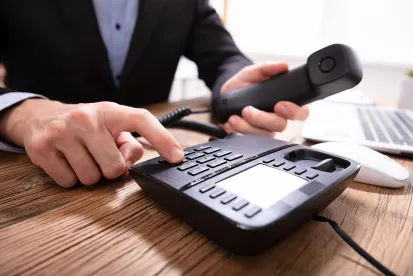In December, we reported on the oral argument in the U.S. Supreme Court in Facebook v. Duguid, which presented the question of what was required for equipment to qualify as an automatic telephone dialing system (“ATDS”) under the Telephone Consumer Protection Act (“TCPA”).
Yesterday, a unanimous Supreme Court, in an opinion authored by Justice Sotomayor, held that to be an ATDS, the device must have the capacity both to store a telephone number using a random or sequential generator, or to produce a telephone number using a random or sequential number generator. The Court held that equipment that has the capacity to store and dial telephone numbers but which does not use a random or sequential number generator to do so, is not an autodialer for TCPA purposes.
The TCPA makes it unlawful to call (or send a text message to) a wireless phone using an ATDS unless the called party has consented to receive such calls. The statute defines an ATDS as “equipment which has the capacity — (A) to store or produce telephone numbers to be called, using a random or sequential number generator; and (B) to dial such numbers.” 47 U.S.C. § 227(a)(1). The question presented in Facebook was whether this statutory definition requires the equipment to have the capacity to “store” or “produce” telephone numbers, using a random or sequential number generator to do so.
Justice Sotomayor’s opinion analyzed the statutory text, grammar rules and statutory context. These pointed to the conclusion that Congress meant that, yes, “using a random or sequential number generator” modifies both “store” and “produce.” The Court wrote, “Congress defined an autodialer in terms of what it must do (‘store and produce telephone numbers to be called,’) and how it must do it (‘using a random or sequential number generator’).” The Court squarely rejected “expanding the definition of an autodialer to encompass any equipment that merely stores and dials telephone numbers,” suggesting it would bring cell phones with speed dialing capabilities under the TCPA. Doing this would, as the Court wrote, “take a chainsaw to these nuanced problems when Congress meant to use a scalpel.”
Justice Alito wrote a concurring opinion, which agreed with much of the Court’s analysis but questioned the Court’s heavy reliance on canons of interpretation.
This ruling drastically narrows the type of equipment falling within the TCPA’s purview, at least with respect to calls to wireless phones. It also resolves a circuit split, clarifying the definition of an ATDS across the country and providing more certainty for parties engaged in TCPA class action litigation.
While a big win for callers, the Facebook decision is not the end of the road for TCPA litigation or compliance long-term, for three main reasons:
-
The Facebook decision noted that it does not impact the TCPA’s regulation of calls using artificial or prerecorded voices, i.e., robocalls. It also does not impact the TCPA’s limitations on calls to numbers listed in the National DNC Registry.
-
Some courts have previously held that it is the equipment’s capacity to perform the aforementioned functions, not the usage of those functions, that triggers the TCPA. Although Facebook states that the equipment in question must use a random or sequential number generator to trigger the TCPA, other language, including the Court’s ultimate holding, “that a necessary feature of an autodialer…is the capacity to use a random or sequential number generator to either store or produce phone numbers,” points in the direction of retaining the “capacity” concept. Plaintiffs may therefore try to use the decision to support the argument that is the capacity of the equipment, not how it is actually used, that matters in TCPA litigation moving forward.
-
New technologies and communications tools continue to develop and companies still need to remain mindful their telemarketing practices comply with the TCPA and related state statutes





 />i
/>i

